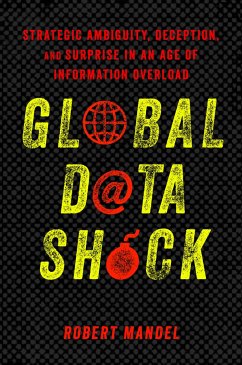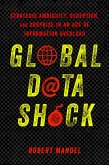Robert Mandel
Global Data Shock
Strategic Ambiguity, Deception, and Surprise in an Age of Information Overload
Robert Mandel
Global Data Shock
Strategic Ambiguity, Deception, and Surprise in an Age of Information Overload
- Broschiertes Buch
- Merkliste
- Auf die Merkliste
- Bewerten Bewerten
- Teilen
- Produkt teilen
- Produkterinnerung
- Produkterinnerung
Robert Mandel is Professor of International Affairs at Lewis & Clark College and the author of fifteen books on international security and strategy.
Andere Kunden interessierten sich auch für
![Global Data Shock Global Data Shock]() Robert MandelGlobal Data Shock160,99 €
Robert MandelGlobal Data Shock160,99 €![Big Data and Democracy Big Data and Democracy]() Big Data and Democracy150,99 €
Big Data and Democracy150,99 €![The Shock Doctrine The Shock Doctrine]() Naomi KleinThe Shock Doctrine14,99 €
Naomi KleinThe Shock Doctrine14,99 €![Political Data Handbook Political Data Handbook]() Jan-Erik LanePolitical Data Handbook234,99 €
Jan-Erik LanePolitical Data Handbook234,99 €![Irish Political Studies Data Yearbook Irish Political Studies Data Yearbook]() Karin Gilland / Fiachra Kennedy (eds.)Irish Political Studies Data Yearbook174,99 €
Karin Gilland / Fiachra Kennedy (eds.)Irish Political Studies Data Yearbook174,99 €![A Manual for the Constitutional Convention, 1917: Submitted to the Constitutional Convention by the Commission to Compile Information and Data for the A Manual for the Constitutional Convention, 1917: Submitted to the Constitutional Convention by the Commission to Compile Information and Data for the]() William Bennett MunroA Manual for the Constitutional Convention, 1917: Submitted to the Constitutional Convention by the Commission to Compile Information and Data for the39,99 €
William Bennett MunroA Manual for the Constitutional Convention, 1917: Submitted to the Constitutional Convention by the Commission to Compile Information and Data for the39,99 €![The Global Impact of Renewable Energy and Data Analytics The Global Impact of Renewable Energy and Data Analytics]() Kingsley OnyeagusiThe Global Impact of Renewable Energy and Data Analytics16,95 €
Kingsley OnyeagusiThe Global Impact of Renewable Energy and Data Analytics16,95 €-
-
-
Robert Mandel is Professor of International Affairs at Lewis & Clark College and the author of fifteen books on international security and strategy.
Hinweis: Dieser Artikel kann nur an eine deutsche Lieferadresse ausgeliefert werden.
Hinweis: Dieser Artikel kann nur an eine deutsche Lieferadresse ausgeliefert werden.
Produktdetails
- Produktdetails
- Verlag: Stanford University Press
- Seitenzahl: 272
- Erscheinungstermin: 23. April 2019
- Englisch
- Abmessung: 228mm x 149mm x 20mm
- Gewicht: 409g
- ISBN-13: 9781503608962
- ISBN-10: 1503608964
- Artikelnr.: 53542384
- Herstellerkennzeichnung
- Libri GmbH
- Europaallee 1
- 36244 Bad Hersfeld
- gpsr@libri.de
- Verlag: Stanford University Press
- Seitenzahl: 272
- Erscheinungstermin: 23. April 2019
- Englisch
- Abmessung: 228mm x 149mm x 20mm
- Gewicht: 409g
- ISBN-13: 9781503608962
- ISBN-10: 1503608964
- Artikelnr.: 53542384
- Herstellerkennzeichnung
- Libri GmbH
- Europaallee 1
- 36244 Bad Hersfeld
- gpsr@libri.de
Robert Mandel is Professor of International Affairs at Lewis & Clark College and the author of fifteen books on international security and strategy.
Contents and Abstracts
Introduction
chapter abstract
This introduction identifies the study's central puzzles; delimits the
scope of the discussion (including its geographical scope, its time frame,
and substantive issues covered); explains what makes the analysis unique
and provocative; and highlights the linkages between this investigation and
broader security questions. The necessary background is provided to clarify
why studying global data shock, incorporating the security impact of
information overload on strategic ambiguity, deception, and surprise, is
such a critical issue now. There is also an explanation of why it is so
important to incorporate the perspectives of both manipulation initiators
and manipulation targets in this analysis.
1Global Information Overload
chapter abstract
This chapter summarizes the roots and current nature of globally exploding
information overload. It begins by summarizing contrasting reactions to the
information explosion, providing a comparative pre-Internet-Age
retrospective to demonstrate how much more intense the security impacts
have been in recent decades, discussing "big data analysis" promises and
perils, and exploring mass public global data shock fears and concerns. The
chapter then analyzes in detail the major barriers to information
interpretation, including data quantity/quality distortions involving
escalating information overload and security information unreliability;
receiver processing limitations involving human cognitive frailty and
organizational decision inflexibility; and system value heterogeneity
involving global cultural diversity and international political anarchy.
This chapter sets the stage for the resulting increase in strategic
ambiguity, deception, and surprise discussed in the next chapter.
2Global Strategic Manipulation
chapter abstract
This chapter explores the linkages between information overload and the
increasingly evident patterns of strategic manipulation in today's world,
involving ambiguity, deception, and surprise. It specifically examines how
information overload can intensify and expand the range of strategic
manipulation across national boundaries. It then reviews strategic
manipulation goals, comparing those of offensive manipulation initiators
and those of defensive manipulation responders; the general dynamics of
strategic manipulation and the specific dynamics of strategic ambiguity,
deception, and surprise; and a comprehensive assessment of strategic
manipulation costs and benefits. This chapter completes the picture of why
both intelligence analysts and private citizens are currently experiencing
global data shock, overwhelmed with data that they cannot properly
interpret and cannot find appropriate ways to manage.
3Global Data Shock Case Studies
chapter abstract
This chapter presents ten global case studies highlighting distinctive
security challenges for coping with global data shock, for both initiators
using offensive manipulation and targets defending against manipulation
under information overload. The cases are organized by theme-whether the
primary form of manipulation exhibited by initiators is strategic
ambiguity, manipulation, or surprise. Highlighting strategic ambiguity are
the 2017 foreign security policy style of American president Donald Trump,
the 2016 Brexit vote to leave the European Union, and the 2002-2003
nondiscovery of weapons of mass destruction in Iraq. Highlighting strategic
deception are the 2014 Russian annexation of Crimea, the 2011 Fukushima
nuclear disaster, and the 2008 Russian invasion of Georgia. Highlighting
strategic surprise are the 2007 Israeli destruction of the Syrian al-Kibar
nuclear plant, the 2005 Andijan massacre in Uzbekistan, the 2001 al-Qaeda
terrorist attacks on the United States, and the 1990 Iraqi attack on
Kuwait.
4Emerging Case Patterns
chapter abstract
This chapter reviews the patterns emerging from the ten global case studies
about initiator manipulation facilitation under information overload and
target manipulation vulnerability under information overload, including
patterns specific to strategic ambiguity, deception, and surprise and
patterns specific to manipulation initiators and manipulation targets. Then
it summarizes the trend in post-manipulation tensions, eroding trust and
predictability among longtime allies. Next, it provides a detailed analysis
of under what circumstances (1) information overload most promotes
strategic manipulation; (2) initiators' offensive manipulation and targets'
defensive response are most effective; (3) strategic manipulation is most
legitimate; and (4) strategic manipulation is most dangerous. Finally, the
chapter highlights notable general case lessons informing global data shock
management, and it explains the countermanipulation conundrum that makes
such management so challenging.
5Managing Global Data Shock
chapter abstract
This chapter suggests ways to help to manage information overload and to
assist both initiators and targets to manage strategic ambiguity,
deception, and surprise. Creative thinking is vital to cope with foreign
data interpretation and strategic manipulation, including combining fluid,
innovative, and responsive measures, avoiding "stick-in-the-mud" repetitive
use; discovering or creating new information and communication channels;
and engaging in more systematic advanced contingency planning. The first
step is to avoid the many forms of global data shock mismanagement, which
are chronicled in detail regarding information overload, initiator
offensive manipulation, and target defensive responses. Then the chapter
provides a probing comparative prioritization of general management
strategies, showing decisive advantages for some approaches over others.
Next it provides specific policy recommendations for improving offensive
manipulation and defensive responses under information overload, followed
by specific advice for specifically addressing strategic ambiguity,
manipulation, and surprise.
Conclusion
chapter abstract
This conclusion wraps up the book by identifying how global data shock
stymies the universal search for meaning; how the rise of informal
influence in international relations connects to the growth of strategic
manipulation; how ethical concerns arise from the international use of
strategic manipulation; how a paradox surrounds the desirability of
information transparency on a global scale; how ominous dangers surround
future global data shock trends; and how better human-computer,
state-to-state, and citizen-government collaboration is needed to cope with
global data shock. The emphasis is on taking responsibility to address this
seemingly intractable problem rather than avoiding confronting it or
fatalistically accepting it.
Introduction
chapter abstract
This introduction identifies the study's central puzzles; delimits the
scope of the discussion (including its geographical scope, its time frame,
and substantive issues covered); explains what makes the analysis unique
and provocative; and highlights the linkages between this investigation and
broader security questions. The necessary background is provided to clarify
why studying global data shock, incorporating the security impact of
information overload on strategic ambiguity, deception, and surprise, is
such a critical issue now. There is also an explanation of why it is so
important to incorporate the perspectives of both manipulation initiators
and manipulation targets in this analysis.
1Global Information Overload
chapter abstract
This chapter summarizes the roots and current nature of globally exploding
information overload. It begins by summarizing contrasting reactions to the
information explosion, providing a comparative pre-Internet-Age
retrospective to demonstrate how much more intense the security impacts
have been in recent decades, discussing "big data analysis" promises and
perils, and exploring mass public global data shock fears and concerns. The
chapter then analyzes in detail the major barriers to information
interpretation, including data quantity/quality distortions involving
escalating information overload and security information unreliability;
receiver processing limitations involving human cognitive frailty and
organizational decision inflexibility; and system value heterogeneity
involving global cultural diversity and international political anarchy.
This chapter sets the stage for the resulting increase in strategic
ambiguity, deception, and surprise discussed in the next chapter.
2Global Strategic Manipulation
chapter abstract
This chapter explores the linkages between information overload and the
increasingly evident patterns of strategic manipulation in today's world,
involving ambiguity, deception, and surprise. It specifically examines how
information overload can intensify and expand the range of strategic
manipulation across national boundaries. It then reviews strategic
manipulation goals, comparing those of offensive manipulation initiators
and those of defensive manipulation responders; the general dynamics of
strategic manipulation and the specific dynamics of strategic ambiguity,
deception, and surprise; and a comprehensive assessment of strategic
manipulation costs and benefits. This chapter completes the picture of why
both intelligence analysts and private citizens are currently experiencing
global data shock, overwhelmed with data that they cannot properly
interpret and cannot find appropriate ways to manage.
3Global Data Shock Case Studies
chapter abstract
This chapter presents ten global case studies highlighting distinctive
security challenges for coping with global data shock, for both initiators
using offensive manipulation and targets defending against manipulation
under information overload. The cases are organized by theme-whether the
primary form of manipulation exhibited by initiators is strategic
ambiguity, manipulation, or surprise. Highlighting strategic ambiguity are
the 2017 foreign security policy style of American president Donald Trump,
the 2016 Brexit vote to leave the European Union, and the 2002-2003
nondiscovery of weapons of mass destruction in Iraq. Highlighting strategic
deception are the 2014 Russian annexation of Crimea, the 2011 Fukushima
nuclear disaster, and the 2008 Russian invasion of Georgia. Highlighting
strategic surprise are the 2007 Israeli destruction of the Syrian al-Kibar
nuclear plant, the 2005 Andijan massacre in Uzbekistan, the 2001 al-Qaeda
terrorist attacks on the United States, and the 1990 Iraqi attack on
Kuwait.
4Emerging Case Patterns
chapter abstract
This chapter reviews the patterns emerging from the ten global case studies
about initiator manipulation facilitation under information overload and
target manipulation vulnerability under information overload, including
patterns specific to strategic ambiguity, deception, and surprise and
patterns specific to manipulation initiators and manipulation targets. Then
it summarizes the trend in post-manipulation tensions, eroding trust and
predictability among longtime allies. Next, it provides a detailed analysis
of under what circumstances (1) information overload most promotes
strategic manipulation; (2) initiators' offensive manipulation and targets'
defensive response are most effective; (3) strategic manipulation is most
legitimate; and (4) strategic manipulation is most dangerous. Finally, the
chapter highlights notable general case lessons informing global data shock
management, and it explains the countermanipulation conundrum that makes
such management so challenging.
5Managing Global Data Shock
chapter abstract
This chapter suggests ways to help to manage information overload and to
assist both initiators and targets to manage strategic ambiguity,
deception, and surprise. Creative thinking is vital to cope with foreign
data interpretation and strategic manipulation, including combining fluid,
innovative, and responsive measures, avoiding "stick-in-the-mud" repetitive
use; discovering or creating new information and communication channels;
and engaging in more systematic advanced contingency planning. The first
step is to avoid the many forms of global data shock mismanagement, which
are chronicled in detail regarding information overload, initiator
offensive manipulation, and target defensive responses. Then the chapter
provides a probing comparative prioritization of general management
strategies, showing decisive advantages for some approaches over others.
Next it provides specific policy recommendations for improving offensive
manipulation and defensive responses under information overload, followed
by specific advice for specifically addressing strategic ambiguity,
manipulation, and surprise.
Conclusion
chapter abstract
This conclusion wraps up the book by identifying how global data shock
stymies the universal search for meaning; how the rise of informal
influence in international relations connects to the growth of strategic
manipulation; how ethical concerns arise from the international use of
strategic manipulation; how a paradox surrounds the desirability of
information transparency on a global scale; how ominous dangers surround
future global data shock trends; and how better human-computer,
state-to-state, and citizen-government collaboration is needed to cope with
global data shock. The emphasis is on taking responsibility to address this
seemingly intractable problem rather than avoiding confronting it or
fatalistically accepting it.
Contents and Abstracts
Introduction
chapter abstract
This introduction identifies the study's central puzzles; delimits the
scope of the discussion (including its geographical scope, its time frame,
and substantive issues covered); explains what makes the analysis unique
and provocative; and highlights the linkages between this investigation and
broader security questions. The necessary background is provided to clarify
why studying global data shock, incorporating the security impact of
information overload on strategic ambiguity, deception, and surprise, is
such a critical issue now. There is also an explanation of why it is so
important to incorporate the perspectives of both manipulation initiators
and manipulation targets in this analysis.
1Global Information Overload
chapter abstract
This chapter summarizes the roots and current nature of globally exploding
information overload. It begins by summarizing contrasting reactions to the
information explosion, providing a comparative pre-Internet-Age
retrospective to demonstrate how much more intense the security impacts
have been in recent decades, discussing "big data analysis" promises and
perils, and exploring mass public global data shock fears and concerns. The
chapter then analyzes in detail the major barriers to information
interpretation, including data quantity/quality distortions involving
escalating information overload and security information unreliability;
receiver processing limitations involving human cognitive frailty and
organizational decision inflexibility; and system value heterogeneity
involving global cultural diversity and international political anarchy.
This chapter sets the stage for the resulting increase in strategic
ambiguity, deception, and surprise discussed in the next chapter.
2Global Strategic Manipulation
chapter abstract
This chapter explores the linkages between information overload and the
increasingly evident patterns of strategic manipulation in today's world,
involving ambiguity, deception, and surprise. It specifically examines how
information overload can intensify and expand the range of strategic
manipulation across national boundaries. It then reviews strategic
manipulation goals, comparing those of offensive manipulation initiators
and those of defensive manipulation responders; the general dynamics of
strategic manipulation and the specific dynamics of strategic ambiguity,
deception, and surprise; and a comprehensive assessment of strategic
manipulation costs and benefits. This chapter completes the picture of why
both intelligence analysts and private citizens are currently experiencing
global data shock, overwhelmed with data that they cannot properly
interpret and cannot find appropriate ways to manage.
3Global Data Shock Case Studies
chapter abstract
This chapter presents ten global case studies highlighting distinctive
security challenges for coping with global data shock, for both initiators
using offensive manipulation and targets defending against manipulation
under information overload. The cases are organized by theme-whether the
primary form of manipulation exhibited by initiators is strategic
ambiguity, manipulation, or surprise. Highlighting strategic ambiguity are
the 2017 foreign security policy style of American president Donald Trump,
the 2016 Brexit vote to leave the European Union, and the 2002-2003
nondiscovery of weapons of mass destruction in Iraq. Highlighting strategic
deception are the 2014 Russian annexation of Crimea, the 2011 Fukushima
nuclear disaster, and the 2008 Russian invasion of Georgia. Highlighting
strategic surprise are the 2007 Israeli destruction of the Syrian al-Kibar
nuclear plant, the 2005 Andijan massacre in Uzbekistan, the 2001 al-Qaeda
terrorist attacks on the United States, and the 1990 Iraqi attack on
Kuwait.
4Emerging Case Patterns
chapter abstract
This chapter reviews the patterns emerging from the ten global case studies
about initiator manipulation facilitation under information overload and
target manipulation vulnerability under information overload, including
patterns specific to strategic ambiguity, deception, and surprise and
patterns specific to manipulation initiators and manipulation targets. Then
it summarizes the trend in post-manipulation tensions, eroding trust and
predictability among longtime allies. Next, it provides a detailed analysis
of under what circumstances (1) information overload most promotes
strategic manipulation; (2) initiators' offensive manipulation and targets'
defensive response are most effective; (3) strategic manipulation is most
legitimate; and (4) strategic manipulation is most dangerous. Finally, the
chapter highlights notable general case lessons informing global data shock
management, and it explains the countermanipulation conundrum that makes
such management so challenging.
5Managing Global Data Shock
chapter abstract
This chapter suggests ways to help to manage information overload and to
assist both initiators and targets to manage strategic ambiguity,
deception, and surprise. Creative thinking is vital to cope with foreign
data interpretation and strategic manipulation, including combining fluid,
innovative, and responsive measures, avoiding "stick-in-the-mud" repetitive
use; discovering or creating new information and communication channels;
and engaging in more systematic advanced contingency planning. The first
step is to avoid the many forms of global data shock mismanagement, which
are chronicled in detail regarding information overload, initiator
offensive manipulation, and target defensive responses. Then the chapter
provides a probing comparative prioritization of general management
strategies, showing decisive advantages for some approaches over others.
Next it provides specific policy recommendations for improving offensive
manipulation and defensive responses under information overload, followed
by specific advice for specifically addressing strategic ambiguity,
manipulation, and surprise.
Conclusion
chapter abstract
This conclusion wraps up the book by identifying how global data shock
stymies the universal search for meaning; how the rise of informal
influence in international relations connects to the growth of strategic
manipulation; how ethical concerns arise from the international use of
strategic manipulation; how a paradox surrounds the desirability of
information transparency on a global scale; how ominous dangers surround
future global data shock trends; and how better human-computer,
state-to-state, and citizen-government collaboration is needed to cope with
global data shock. The emphasis is on taking responsibility to address this
seemingly intractable problem rather than avoiding confronting it or
fatalistically accepting it.
Introduction
chapter abstract
This introduction identifies the study's central puzzles; delimits the
scope of the discussion (including its geographical scope, its time frame,
and substantive issues covered); explains what makes the analysis unique
and provocative; and highlights the linkages between this investigation and
broader security questions. The necessary background is provided to clarify
why studying global data shock, incorporating the security impact of
information overload on strategic ambiguity, deception, and surprise, is
such a critical issue now. There is also an explanation of why it is so
important to incorporate the perspectives of both manipulation initiators
and manipulation targets in this analysis.
1Global Information Overload
chapter abstract
This chapter summarizes the roots and current nature of globally exploding
information overload. It begins by summarizing contrasting reactions to the
information explosion, providing a comparative pre-Internet-Age
retrospective to demonstrate how much more intense the security impacts
have been in recent decades, discussing "big data analysis" promises and
perils, and exploring mass public global data shock fears and concerns. The
chapter then analyzes in detail the major barriers to information
interpretation, including data quantity/quality distortions involving
escalating information overload and security information unreliability;
receiver processing limitations involving human cognitive frailty and
organizational decision inflexibility; and system value heterogeneity
involving global cultural diversity and international political anarchy.
This chapter sets the stage for the resulting increase in strategic
ambiguity, deception, and surprise discussed in the next chapter.
2Global Strategic Manipulation
chapter abstract
This chapter explores the linkages between information overload and the
increasingly evident patterns of strategic manipulation in today's world,
involving ambiguity, deception, and surprise. It specifically examines how
information overload can intensify and expand the range of strategic
manipulation across national boundaries. It then reviews strategic
manipulation goals, comparing those of offensive manipulation initiators
and those of defensive manipulation responders; the general dynamics of
strategic manipulation and the specific dynamics of strategic ambiguity,
deception, and surprise; and a comprehensive assessment of strategic
manipulation costs and benefits. This chapter completes the picture of why
both intelligence analysts and private citizens are currently experiencing
global data shock, overwhelmed with data that they cannot properly
interpret and cannot find appropriate ways to manage.
3Global Data Shock Case Studies
chapter abstract
This chapter presents ten global case studies highlighting distinctive
security challenges for coping with global data shock, for both initiators
using offensive manipulation and targets defending against manipulation
under information overload. The cases are organized by theme-whether the
primary form of manipulation exhibited by initiators is strategic
ambiguity, manipulation, or surprise. Highlighting strategic ambiguity are
the 2017 foreign security policy style of American president Donald Trump,
the 2016 Brexit vote to leave the European Union, and the 2002-2003
nondiscovery of weapons of mass destruction in Iraq. Highlighting strategic
deception are the 2014 Russian annexation of Crimea, the 2011 Fukushima
nuclear disaster, and the 2008 Russian invasion of Georgia. Highlighting
strategic surprise are the 2007 Israeli destruction of the Syrian al-Kibar
nuclear plant, the 2005 Andijan massacre in Uzbekistan, the 2001 al-Qaeda
terrorist attacks on the United States, and the 1990 Iraqi attack on
Kuwait.
4Emerging Case Patterns
chapter abstract
This chapter reviews the patterns emerging from the ten global case studies
about initiator manipulation facilitation under information overload and
target manipulation vulnerability under information overload, including
patterns specific to strategic ambiguity, deception, and surprise and
patterns specific to manipulation initiators and manipulation targets. Then
it summarizes the trend in post-manipulation tensions, eroding trust and
predictability among longtime allies. Next, it provides a detailed analysis
of under what circumstances (1) information overload most promotes
strategic manipulation; (2) initiators' offensive manipulation and targets'
defensive response are most effective; (3) strategic manipulation is most
legitimate; and (4) strategic manipulation is most dangerous. Finally, the
chapter highlights notable general case lessons informing global data shock
management, and it explains the countermanipulation conundrum that makes
such management so challenging.
5Managing Global Data Shock
chapter abstract
This chapter suggests ways to help to manage information overload and to
assist both initiators and targets to manage strategic ambiguity,
deception, and surprise. Creative thinking is vital to cope with foreign
data interpretation and strategic manipulation, including combining fluid,
innovative, and responsive measures, avoiding "stick-in-the-mud" repetitive
use; discovering or creating new information and communication channels;
and engaging in more systematic advanced contingency planning. The first
step is to avoid the many forms of global data shock mismanagement, which
are chronicled in detail regarding information overload, initiator
offensive manipulation, and target defensive responses. Then the chapter
provides a probing comparative prioritization of general management
strategies, showing decisive advantages for some approaches over others.
Next it provides specific policy recommendations for improving offensive
manipulation and defensive responses under information overload, followed
by specific advice for specifically addressing strategic ambiguity,
manipulation, and surprise.
Conclusion
chapter abstract
This conclusion wraps up the book by identifying how global data shock
stymies the universal search for meaning; how the rise of informal
influence in international relations connects to the growth of strategic
manipulation; how ethical concerns arise from the international use of
strategic manipulation; how a paradox surrounds the desirability of
information transparency on a global scale; how ominous dangers surround
future global data shock trends; and how better human-computer,
state-to-state, and citizen-government collaboration is needed to cope with
global data shock. The emphasis is on taking responsibility to address this
seemingly intractable problem rather than avoiding confronting it or
fatalistically accepting it.








